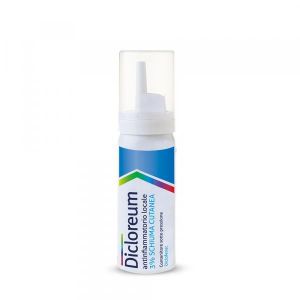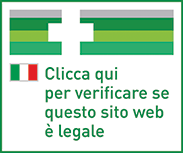Ship in Europe, Find out rates!

Dicloreum Antinfiammatorio Locale 3% Schiuma Cutanea 50 g
ALFASIGMA
Skin foam with anti-inflammatory action based on the active ingredient diclofenac.
Therapeutic indications
Dicloreum 3% Cutaneous Foam is used in the local treatment of painful and inflammatory conditions of a rheumatic or traumatic nature of the joints, muscles, tendons and ligaments due to rheumatic diseases or trauma.
Dosage and posology
Use in adults: Apply the medicine 1 to 3 times a day or as prescribed by your doctor. Warning: use only for short periods of treatment. Consult your doctor if the disorder occurs repeatedly or if you notice any recent changes in its characteristics.
Use in adolescents aged 14 to 18: apply the skin foam 1-3 times a day or as prescribed. If this medicine is needed for more than 7 days to relieve pain or if symptoms worsen, consult your doctor.
Use in children and adolescents under 14 years of age: do not use in children and adolescents under 14 years of age as insufficient data are available to evaluate the safety and efficacy of the medicinal product in this age group.
Use in the Elderly: The usual adult dosage may be used.
How to use
Shake the can before use and, holding it upside down, press the dispenser. For each application, spray a circular mass of foam 3-5 centimeters in diameter onto the palm of your hand and place it on the area to be treated. Continue with gentle massages until the medicine is completely absorbed into the skin.
Remember to always wash your hands after each application to avoid that your hands are also treated by the medicinal foam. Local Anti-Inflammatory Dicloreum can be used in conjunction with ultrasound therapy. In case of iontophoresis treatment, the product must be applied to the negative pole.
Overdose
If you use more Local Anti-Inflammatory Dicloreum than you should tell your doctor immediately or contact the nearest hospital. As this medicine acts locally on the skin, the body's absorption of the active ingredient is very low and it is unlikely that overdose can occur. However, using too much medicine or accidentally taking it by mouth can cause unwanted effects.
Contraindications
Do not use Local Anti-inflammatory Dicloreum:
- if you are allergic to diclofenac or any of the other ingredients of this medicine
- if you are allergic to medicines containing acetylsalicylic acid (e.g. aspirin) and to other non-steroidal anti-inflammatory drugs (NSAIDs) or to a disinfectant called isopropanol.
- in case of previous asthma attacks, skin rash (urticaria) or cold which occurred after taking medicines containing acetylsalicylic acid (e.g. aspirin), other non-steroidal anti-inflammatory drugs and isopropanol.
- in the third trimester of pregnancy as it can cause damage to the heart, lungs and kidneys of the fetus
- in children and adolescents under 14 years of age as data on the safety and efficacy of the medicine in this age group are not known.
Side effects
Like all medicines, this medicine can cause side effects, although not everybody gets them.
- Common side effects (may affect up to 1 in 10 people): rash on the skin (rash), intense redness of the skin and blistering (eczema, erythema), inflammatory skin reactions (dermatitis, including contact dermatitis) , itch.
- Rare side effects (may affect up to 1 in 1,000 people): skin inflammation with blisters (bullous dermatitis).
- Very rare side effects (may affect up to 1 in 10,000 people): allergic reactions, including rash (hives) rapid swelling of the skin (angioneurotic edema) skin rash with pustules asthma skin reactions to sunlight (photosensitivity)
Dicloreum in combination with other medicines containing diclofenac may cause the following side effects: hypersensitivity to light, blistering rash, eczema, erythema, severely evolving skin reactions (Stevens-Johnson syndrome, Lyell's syndrome).
Pregnancy and breastfeeding
If you are pregnant or breast-feeding, think you may be pregnant or are planning to have a baby, ask your doctor or pharmacist for advice before using this medicine.
- Pregnancy
During the first or second trimester of pregnancy, remember to keep the dose as low as possible and the duration of treatment as short as possible to avoid the risk of miscarriage and birth defects. Do not use the medicine during the third trimester of pregnancy as non-steroidal anti-inflammatory drugs can cause: damage to the heart, lungs and kidneys of the fetus, prolonged bleeding time in the mother and newborn, an impediment to uterine contractions in the mother with delay or prolongation of childbirth.
- Feeding time
As with other non-steroidal anti-inflammatory drugs, the diclofenac contained in this medicine is released into breast milk. At the recommended doses of local anti-inflammatory dicloreum no effects on the infant are anticipated, however, due to lack of adequate studies, breastfeeding women can only use this medicine under the advice of a doctor or pharmacist. In this case, remember not to apply the medicine to the breasts, or to large areas of skin and for long periods of time.
Special warnings
The use, especially if prolonged and on large surfaces of the skin, of anti-inflammatories for local use could give rise to undesirable effects on the body. Local Anti-inflammatory Dicloreum Uses:
- only on intact, non-diseased skin that has no wounds or open lesions.
- only with bandages that let the air pass and not with tight bandages.
Pay attention that the foam does not come into contact with your eyes and avoid swallowing it. Use local anti-inflammatory dicloreum with particular caution:
- if you have ever had allergic reactions, such as asthma attacks, skin rashes or an acute allergic cold, as a result of taking non-steroidal anti-inflammatory drugs or pain relievers.
- if you suffer from asthma, chronic obstructive diseases of the bronchi, allergic cold or inflammation of the nasal mucosa (nasal polyps) because you can experience asthma attacks more easily than other patients, local inflammation of the skin or mucous membranes (edema of Quincke) and skin rash (hives).
- if you are an elderly patient or suffer from stomach problems, because you must avoid taking other anti-inflammatory medicines by mouth, suppository or injection at the same time.
Stop the treatment and contact your doctor or pharmacist:
- If you get a rash after applying the medicine.
- If allergic reactions occur after the application, especially if prolonged, of other medicines for local use.
Avoid excessive exposure to the sun while using Local Anti-inflammatory Dicloreum to avoid possible phenomena of sensitization to sunlight.
Local anti-inflammatory dicloreum contains potassium sorbate Potassium sorbate may cause local skin reactions (eg contact dermatitis).
Expiry and retention
Check the expiration date indicated on the package. The expiry date indicated on the package refers to the product in intact packaging, correctly stored. Store this medicine in the original package below 30 ° C.
Warning : do not use the medicine after the expiry date indicated on the package.
Composition
100 g of local anti-inflammatory dicloreum skin foam contain:
Active principle
3 g of diclofenac.
Excipients
Potassium sorbate, sodium hydroxide, macroglycerols caprylocaprates, phospholipon 80 H, polysorbate 80, benzyl alcohol, disodium phosphate dodecahydrate, tocopherol acetate, mint / eucalyptus fragrance, purified water.
| Destination | Cost | Detail |
|---|---|---|
| Italy | €5,90* | 24/72H |
| Austria, France, Germany, Slovenia | € 13* | 3 days |
| Belgium, Luxembourg, Portugal, Netherlands, Spain | € 14* | 4 days |
| Bulgary, Cechia, Hungary, Poland, Romania, Slovakia | € 19* | 5 days |
| Denmark, Estonia, Finland, Ireland, Lithuania, Latvia ,Sweden | € 22* | 5 days |
| United Kingdom, Switzerland, Greece | € 30* | 7 days |
| Canada, USA | € 40 | 7 Days |
European shipments with express courier: FedEx, MBE, DHL
*For the shipment outside band B ther's an extra cost of 22€ *For the shipment outside band C ther's an extra cost of 30€ Delivery Times exclude Saturday and Holidays
For Islands and Areas of difficult Accessibility the shipments are made in 72 hours and the cost will be increased by 15€
